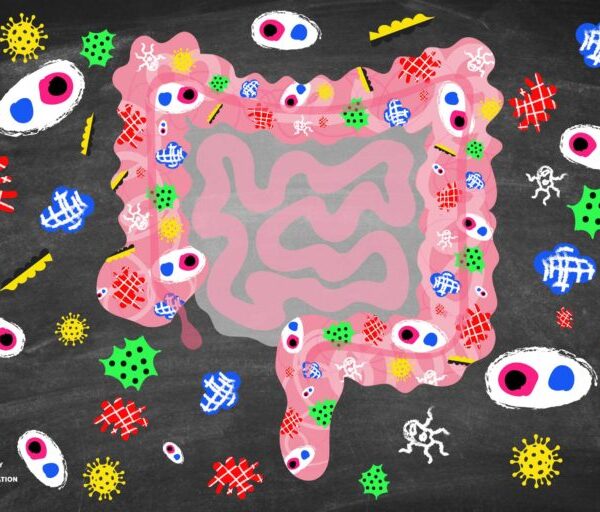In honor of World IBD Day, dietitians from three different continents share tips on managing diet and inflammatory bowel disease (IBD).
WHAT IS THE MICROBIOME AND WHY DOES IT MATTER FOR IBD?
WHAT IS THE MICROBIOME AND WHY DOES IT MATTER FOR IBD?
December 3, 2020
Anne M. Sydor

A World With Microscopic Pets
We human beings provide homes for many organisms, and not just our beloved cats, dogs, birds, and lizards! We provide a home to trillions of microscopic organisms—the bacteria, viruses, and funguses (like yeast) that live in or on our bodies. It’s true that we often think of all microscopic organisms as disease-causing, dirty, and unwanted. Just look at all the antimicrobial soaps and sanitizers in the personal care aisle at the market.
As important as it is to wash our hands to prevent infection with harmful organisms—especially in the era of COVID-19—there are also other organisms that we need for our bodies to be healthy. A good way to understand this is to think about an unwanted side effect of many antibiotics—diarrhea. Antibiotics not only kill whatever germ making us sick, they also kill some of the bacteria in our gut that help us digest our food. When the balance of micro-organisms that is its own little world—the microbiome—is disturbed, that also causes disease. We need our littlest pets—the microscopic ones living on and in us too!
The Digestive System Microbiome
In our mouths, stomachs, intestines, there are more than 100 trillion different micro-organisms living in harmony together and with us, their host. These organisms help us get the nutrients we need from food and protect us, through our immune system, from microscopic invaders that cause disease. In that framework, it makes sense that infection of the gut involves malfunction of the microbiome. But what about diseases like inflammatory bowel disease (IBD) that are not infections? What is the role of the microbiome in those diseases?
The answer is that we are still not entirely sure. Research on the microbiome is pretty new. In 2008, only 500 or so research papers on the microbiome had been published; from 2009 to 2019 there were 15,000! There is still so much to learn about the trillions of organisms that call us home and the role of the microbiome in health and disease.
Theories of the Microbiome Role in Inflammatory Bowel Disease
A role for the microbiome in inflammatory bowel disease (IBD) was suggested as early as the 1950s when dietary treatments were being explored (which is still happening). The idea was that an imbalance of organisms in the gut (too much of one and too little of another, for example) was either caused by or causing the gut injuries that define IBD, creating a vicious cycle of injury-imbalance-injury.
Since then, several differences in the microbiomes of people with IBD have been identified. There are 8 groups of organisms in the microbiome found at higher levels in people with IBD, and microbiomes of people with IBD also change more often. It has also been shown that having a gut infection called gastroenteritis (commonly thought of as stomach flu or food poisoning) makes a person more likely to have IBD. On the other hand, being breast-fed as an infant, drinking unpasteurized milk, and eating pork—which all expose a person to a wider variety of micro-organisms—make a person less likely to develop IBD. Perhaps the strongest evidence for a role of the microbiome in IBD is that a type of bacteria that produces a natural anti-inflammatory agent is found in very low levels in IBD, and a fungus known to cause inflammation is found more often in people with IBD.
The pattern of IBD occurrence around the globe and where it has become more common over time follows the pattern of industrial development, which tends to increase use of antibiotics and other antimicrobials. This supports the hygiene hypothesis that suggests being exposed to too few micro-organisms in childhood inhibits the development of the immune system and therefore makes people more susceptible to IBD. Of course, industrial development brings many other changes that could also explain increases in IBD.
The most important thing to know about all these observations is that we don’t know yet these are causes or effects of IBD. Just as we can ask whether the chicken or the egg came first, so too we can ask, “which came first, the IBD or the microbiome differences?”
Why Does it Matter?
Understanding what causes a disease can help in understanding how to treat it so people with IBD can live better lives. But diseases like IBD that involve the environment (including the microbiome), a person’s genetics, and normal immune reactions gone wrong are still pretty tough for us to understand.
If we find out that imbalances in the microbiome really are the cause of IBD or that once it is affected a changed microbiome makes IBD keep happening, then treatments to adjust the microbiome could be effective.
Medicines and treatments have been successfully developed based on theories of what might be effective, however. So, it makes sense that treatments that target the microbiome in IBD are being developed and evaluated already. These include probiotic supplements, specific diets, and fecal transplants. Although all are being carefully tested, there is not enough evidence yet to say that any of these are truly effective for treating IBD.
What Can We Do with This Information Now?
Unfortunately, there is no clear answer to this question yet. If you have IBD, your microbiome may already be changed, but it also may not. It is important that people with IBD talk to their health care team before trying any new supplement, including probiotics, or diet. Even though most will not be harmful, some diets can cause malnutrition and other health problems. Probiotics also may not be harmful, but that really depends on what is in a particular supplement and what a specific individual’s needs are. In the meantime, there are effective treatments to help you control your IBD.
We encourage you to partner with your health care team to find the best options for you and advocate for more awareness, support, and research whenever you can.
Glassner KL, Abraham BP, Quigley EMM. The microbiome and inflammatory bowel disease. J Allergy Clin Immunol. 2020;145(1):16-27. doi:10.1016/j.jaci.2019.11.003
SUBSCRIBE TO GHLF
RELATED POST AND PAGES
_
Was this article helpful?
YesNo




